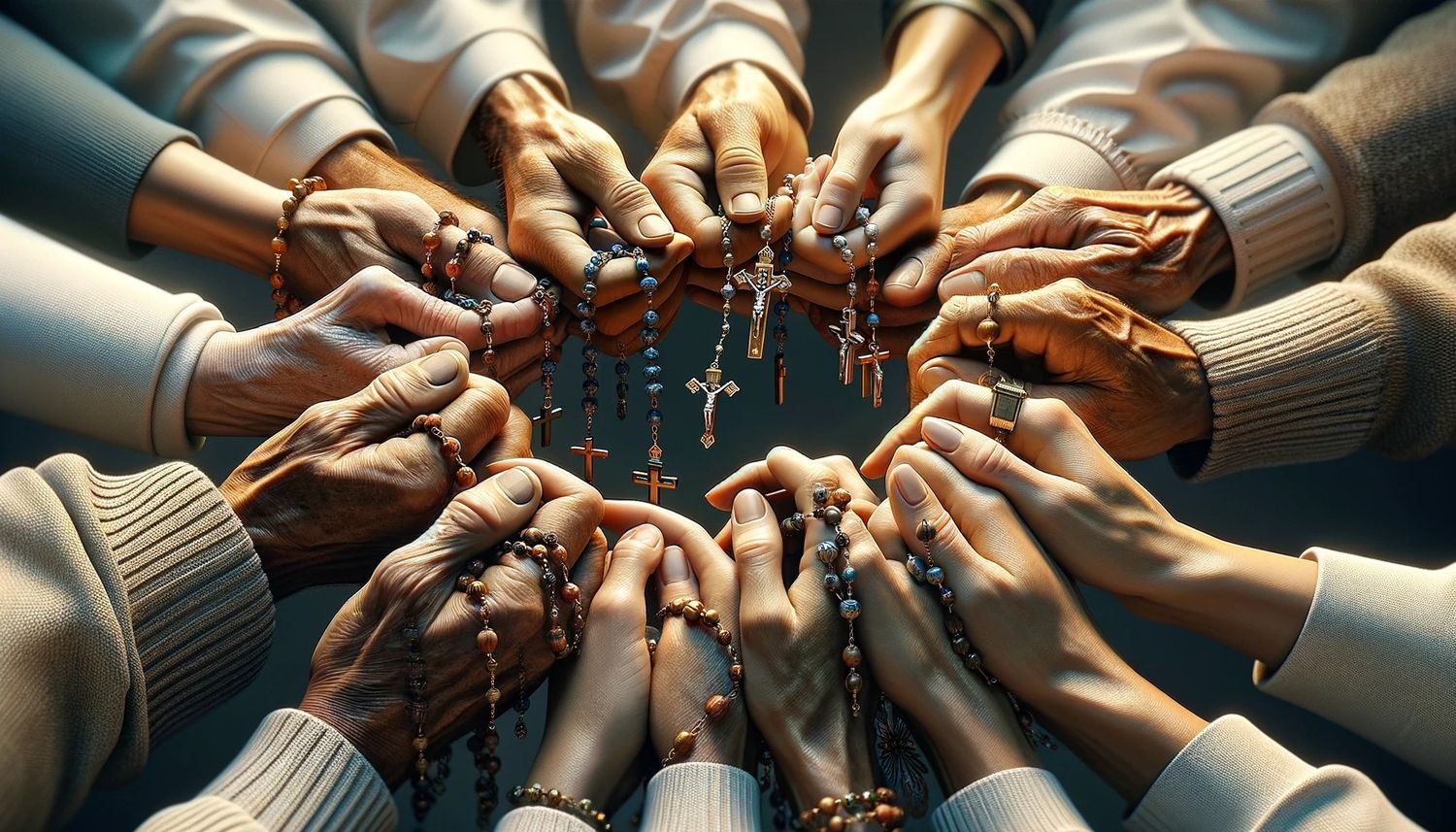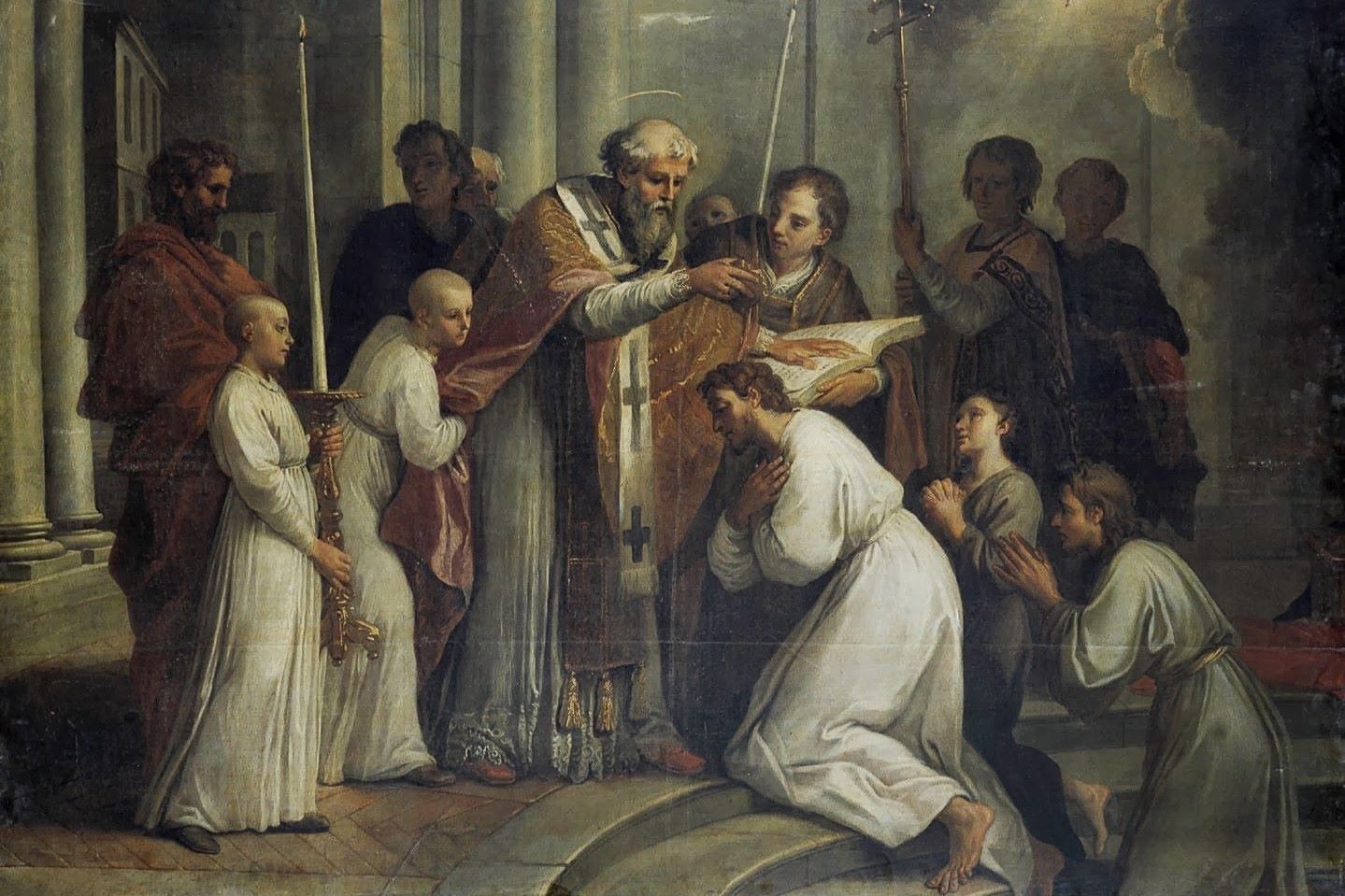Home>Theology and Spirituality>How To Convert From Catholic To Baptist


Theology and Spirituality
How To Convert From Catholic To Baptist
Published: February 23, 2024
Peter Smith, Editorial Director at Christian.net, combines deep insights into faith, politics, and culture to lead content creation that resonates widely. Awarded for his contributions to religious discourse, he previously headed a major organization for religious communicators, enhancing dialogue on faith's societal impacts.
Learn how to convert from Catholic to Baptist and explore the differences in theology and spirituality. Find guidance and resources for your spiritual journey.
(Many of the links in this article redirect to a specific reviewed product. Your purchase of these products through affiliate links helps to generate commission for Christian.net, at no extra cost. Learn more)
Table of Contents
Introduction
Transitioning from Catholicism to Baptist faith involves a significant spiritual journey that encompasses both personal and communal aspects. This shift may stem from a deep desire for a different religious experience, a longing for a more personal connection with God, or a yearning for a new community of believers. Whatever the motivation, the decision to convert from Catholicism to Baptist faith marks a pivotal moment in one's spiritual life.
The Catholic and Baptist traditions differ in various theological and practical aspects, including beliefs about the sacraments, the role of clergy, and the structure of worship services. Understanding these differences is crucial for individuals seeking to make this transition. It's important to approach this process with an open heart and a willingness to embrace new perspectives and practices.
As you embark on this journey, it's essential to remember that faith is a deeply personal matter. Your decision to explore a new religious path should be guided by a genuine quest for spiritual fulfillment and a deeper connection with God. It's a journey that requires introspection, study, and a willingness to engage with a new community of believers.
In the following sections, we will delve into the intricacies of transitioning from Catholicism to Baptist faith, offering guidance on understanding the differences between the two traditions, finding a Baptist church, meeting with a Baptist pastor, navigating baptism and membership, and adjusting to Baptist worship and practices. This comprehensive guide aims to provide valuable insights and support as you embark on this transformative spiritual journey.
Read more: How To Convert A Muslim To Catholicism
Understanding the Differences Between Catholicism and Baptist Beliefs
The transition from Catholicism to Baptist faith involves a profound shift in theological perspectives and religious practices. Understanding the disparities between these two traditions is essential for individuals seeking to embrace the Baptist faith. Here are the key differences between Catholicism and Baptist beliefs:
1. Authority and Tradition
In Catholicism, the authority is vested in the Pope and the Magisterium, which interprets and upholds the traditions and teachings of the Church. The Catholic Church places significant emphasis on tradition, including the veneration of saints and the use of sacramentals. On the other hand, Baptists adhere to the sole authority of the Bible, emphasizing the priesthood of all believers and the autonomy of each local church. Baptist beliefs prioritize the direct interpretation of scripture by individuals and the congregation.
2. Sacraments and Ordinances
Catholicism recognizes seven sacraments, including baptism, confirmation, and the Eucharist, as essential channels of God's grace. These sacraments are considered sacred and are administered by clergy. In contrast, Baptists view baptism and communion as ordinances, symbolic acts that commemorate the death and resurrection of Jesus Christ. Baptism is reserved for believers and is typically administered through immersion, symbolizing the believer's identification with Christ's death, burial, and resurrection.
3. Worship and Liturgy
Catholic worship is characterized by liturgical rituals, including the celebration of the Mass, recitation of prayers such as the Rosary, and the observance of various feast days and holy seasons. The use of symbols, incense, and religious art is integral to Catholic worship. In contrast, Baptist worship is often less formal, with a focus on congregational singing, expository preaching, and prayer. The Baptist tradition places a strong emphasis on heartfelt, participatory worship and the proclamation of the Gospel.
Read more: How To Convert To Catholicism For Marriage
4. Salvation and Atonement
Catholic theology emphasizes the role of good works, sacraments, and participation in the Church's grace-giving activities as integral to salvation. The concept of purgatory and the intercession of saints also feature prominently in Catholic beliefs. In contrast, Baptists adhere to the belief in salvation by grace through faith in Jesus Christ alone. They emphasize the atoning sacrifice of Christ on the cross and the personal relationship with God as the cornerstone of salvation.
Understanding these fundamental differences is crucial for individuals navigating the transition from Catholicism to Baptist faith. It involves a deep exploration of theological principles, spiritual practices, and the underlying foundations of each tradition. This understanding forms the bedrock for a meaningful and informed transition, enabling individuals to embrace the Baptist faith with clarity and conviction.
Finding a Baptist Church
Embarking on the journey of transitioning from Catholicism to Baptist faith involves the pivotal step of finding a Baptist church that aligns with your spiritual convictions and provides a nurturing community for your faith journey. Here are essential steps to guide you in this significant quest:
-
Research and Exploration: Begin by conducting thorough research on Baptist churches in your local area or within a reasonable commuting distance. Utilize online resources, such as church directories and community forums, to identify Baptist congregations. Consider the denominational affiliations within the Baptist tradition, such as Southern Baptist, American Baptist, or Independent Baptist, and explore their respective beliefs and practices to discern which aligns most closely with your spiritual inclinations.
-
Attend Worship Services and Events: Actively engage with the Baptist community by attending worship services, prayer gatherings, and other church events. This firsthand experience will provide valuable insights into the worship style, preaching approach, and overall atmosphere of the congregation. Pay attention to the sense of community, the clarity of biblical teaching, and the opportunities for spiritual growth and service within the church.
-
Seek Recommendations and Referrals: Reach out to friends, family members, or acquaintances who are part of Baptist congregations for recommendations. Personal referrals can offer valuable perspectives and firsthand accounts of the spiritual dynamics and community life within specific Baptist churches. Additionally, seek guidance from individuals who have undergone a similar transition from Catholicism to Baptist faith, as they can provide unique insights and support.
-
Engage in Conversations: Initiate conversations with members of the Baptist community, including church leaders, pastors, and fellow parishioners. Express your genuine interest in exploring the Baptist faith and inquire about the church's doctrinal stance, its approach to discipleship and outreach, and its commitment to fostering a welcoming and inclusive environment for newcomers.
-
Prayerful Discernment: Approach the process of finding a Baptist church with prayerful discernment, seeking God's guidance and wisdom. Reflect on your spiritual needs, the doctrinal alignment that resonates with your beliefs, and the sense of belonging and spiritual nourishment that a particular congregation offers. Allow your spiritual discernment to be informed by both thoughtful consideration and a receptive heart to God's leading.
Finding a Baptist church that serves as a spiritual home during your transition from Catholicism is a significant step in your faith journey. It is a process that requires patience, discernment, and an openness to embracing a new community of believers who will accompany you on this transformative path. As you navigate this search, may you find a Baptist church where you can grow in faith, experience genuine fellowship, and deepen your relationship with God in meaningful ways.
Meeting with a Baptist Pastor
Meeting with a Baptist pastor is a pivotal step in the process of transitioning from Catholicism to Baptist faith. This encounter provides an invaluable opportunity to engage in meaningful dialogue, seek spiritual guidance, and gain insights into the beliefs and practices of the Baptist tradition. Here's a detailed exploration of the significance and dynamics of meeting with a Baptist pastor:
Establishing Personal Connection
Initiating a meeting with a Baptist pastor allows for the establishment of a personal connection within the new faith community. It provides a platform for open communication, enabling individuals to express their spiritual journey, share their background in Catholicism, and articulate their motivations for exploring the Baptist faith. This personal interaction fosters a sense of belonging and lays the foundation for a supportive relationship with the pastor and the broader church family.
Read more: How Does Catholic Differ From Baptist
Seeking Spiritual Counsel
Engaging with a Baptist pastor offers the opportunity to seek spiritual counsel and guidance tailored to the specific needs and questions arising from the transition. Individuals can delve into theological inquiries, seek clarity on Baptist doctrines and practices, and address any concerns or uncertainties related to the shift from Catholicism. The pastor's pastoral care and wisdom can provide reassurance, clarity, and spiritual nourishment during this transformative phase.
Exploring Baptism and Membership
Meeting with a Baptist pastor often involves discussions about baptism and membership within the church. The pastor can offer insights into the significance of believer's baptism in the Baptist tradition, explain the process of baptismal preparation, and provide guidance on embracing membership in the local congregation. This dialogue allows individuals to understand the commitments and responsibilities associated with baptism and church membership, paving the way for a deeper integration into the Baptist faith community.
Receiving Support and Encouragement
During the meeting, individuals can receive support and encouragement from the Baptist pastor, who serves as a spiritual shepherd and mentor. The pastor's pastoral presence and words of encouragement can inspire confidence, provide emotional support, and affirm the individual's spiritual journey. This support nurtures a sense of assurance and belonging, reinforcing the decision to transition to the Baptist faith and fostering a spirit of unity within the church body.
Embracing a New Spiritual Journey
Ultimately, meeting with a Baptist pastor marks the beginning of a new spiritual journey within the Baptist faith. It signifies a willingness to engage with a new community of believers, embrace Baptist beliefs and practices, and embark on a path of spiritual growth and discovery. The pastor's guidance and pastoral care play a pivotal role in facilitating a smooth and enriching transition, laying the groundwork for a vibrant and meaningful participation in the life of the Baptist church.
In essence, meeting with a Baptist pastor is a transformative encounter that embodies the spirit of openness, guidance, and support as individuals navigate the transition from Catholicism to Baptist faith. It represents a significant milestone in the journey of faith exploration and signals the embrace of a new spiritual home within the Baptist tradition.
Read more: How Do Adults Convert To Catholicism
Baptism and Membership
Baptism and membership hold profound significance in the transition from Catholicism to Baptist faith, representing pivotal steps in embracing the beliefs and practices of the Baptist tradition. Here's a detailed exploration of the dynamics and implications of baptism and membership within the context of this transformative journey.
Understanding Believer's Baptism
In the Baptist tradition, baptism is a symbolic act that holds deep spiritual meaning. Unlike infant baptism practiced in Catholicism, Baptists emphasize believer's baptism, which is reserved for individuals who have made a personal profession of faith in Jesus Christ. This act of immersion symbolizes the believer's identification with Christ's death, burial, and resurrection, signifying a profound spiritual rebirth and commitment to a life of discipleship. Engaging in discussions with the Baptist pastor about the theological underpinnings and spiritual significance of believer's baptism provides individuals with a comprehensive understanding of this sacred ordinance.
Preparation and Commitment
Transitioning from Catholicism to Baptist faith involves a deliberate process of preparation for believer's baptism. Individuals are encouraged to participate in baptismal classes or counseling sessions, where they can delve into the biblical foundations of baptism, reflect on their faith journey, and articulate their personal testimonies. This preparatory phase fosters a deepened sense of commitment and spiritual readiness, enabling individuals to approach baptism with reverence, understanding, and a firm resolve to publicly profess their faith in Christ through this symbolic act.
Embracing Church Membership
Membership in a Baptist church signifies a formal commitment to the faith community and the shared mission of the church. As individuals navigate this transition, they are invited to explore the expectations, privileges, and responsibilities associated with church membership. Engaging in conversations with the Baptist pastor about the process of joining the church, the significance of church membership, and the avenues for active participation within the congregation provides individuals with clarity and guidance as they embrace their new spiritual home.
Read more: Why Do Baptist Hate Catholic
Symbol of Unity and Identity
Baptism and church membership serve as symbols of unity and identity within the Baptist faith community. Through baptism, individuals publicly declare their faith in Christ and their incorporation into the body of believers, affirming their shared identity as followers of Jesus. Similarly, church membership signifies a commitment to walk alongside fellow believers, actively participate in the life of the church, and contribute to the collective mission of spreading the Gospel and nurturing the faith community. These symbols of unity and identity reinforce the individual's integration into the vibrant tapestry of the Baptist church.
Nurturing Spiritual Growth
Ultimately, baptism and membership in a Baptist church lay the groundwork for ongoing spiritual growth and engagement within the faith community. These milestones mark the beginning of a transformative journey, where individuals are embraced by the love and support of their fellow believers, encouraged to deepen their understanding of scripture, and empowered to serve and minister within the church body. The Baptist pastor plays a pivotal role in guiding individuals through this process, nurturing their spiritual growth, and fostering a sense of belonging and purpose within the church family.
In essence, baptism and membership represent profound expressions of faith and commitment as individuals transition from Catholicism to Baptist faith. These sacred rites and formal affiliations within the church embody the essence of spiritual rebirth, communal belonging, and active participation in the life of the Baptist faith community. As individuals embrace these significant aspects of their faith journey, they embark on a path of profound spiritual enrichment, unity, and service within their newfound spiritual home.
Adjusting to Baptist Worship and Practices
Adjusting to Baptist worship and practices marks a significant aspect of the transition from Catholicism to Baptist faith. This transformative process involves embracing new modes of worship, communal engagement, and spiritual expressions within the Baptist tradition. Here's a detailed exploration of the dynamics and nuances involved in adjusting to Baptist worship and practices:
Embracing Congregational Worship
Baptist worship is characterized by a vibrant and participatory approach, emphasizing congregational singing, heartfelt prayer, and expository preaching. As individuals transition from the structured liturgical worship of Catholicism, they are invited to immerse themselves in the dynamic worship experience of Baptist congregations. Engaging in congregational singing of hymns and contemporary worship songs, actively participating in prayer, and attentively receiving biblically-centered sermons form integral components of Baptist worship. Embracing the communal nature of worship fosters a sense of unity, spiritual vitality, and shared devotion within the faith community.
Read more: How Does An Anglican Convert To Catholicism
Navigating Expository Preaching
Expository preaching, a hallmark of Baptist worship, involves the systematic exposition and application of biblical texts. Individuals transitioning from Catholicism encounter a distinctive emphasis on the direct proclamation of God's Word, with sermons delving deeply into the scriptures to illuminate their relevance to contemporary life. Navigating this style of preaching entails an openness to engaging with the Bible as the central authority and source of spiritual nourishment. Embracing expository preaching offers individuals a profound opportunity for personal growth, theological enrichment, and a deeper understanding of the scriptures within the Baptist faith context.
Participating in Prayer and Fellowship
Baptist worship places a strong emphasis on prayer as a means of communal intercession, spiritual communion, and personal connection with God. Transitioning individuals are encouraged to actively participate in corporate prayer, embracing the practice of lifting up collective needs, expressing gratitude, and seeking God's guidance as a unified body of believers. Additionally, engaging in fellowship before and after worship services provides opportunities for building relationships, nurturing a sense of community, and fostering genuine connections with fellow congregants. Embracing these aspects of Baptist worship cultivates a spirit of togetherness, mutual support, and shared spiritual journey within the faith community.
Embracing Informal Worship Atmosphere
Unlike the formal and structured nature of Catholic liturgical worship, Baptist worship often unfolds in a more informal setting, characterized by a warm and welcoming atmosphere. Individuals transitioning from Catholicism are invited to embrace the relaxed and inclusive ambiance of Baptist worship, where the focus is on genuine spiritual engagement, authentic expression, and a sense of relational intimacy with God and fellow believers. Embracing this informal worship environment offers individuals the freedom to express their faith, engage in heartfelt worship, and experience a deep sense of spiritual belonging within the Baptist faith community.
In essence, adjusting to Baptist worship and practices involves a transformative journey of embracing congregational worship, expository preaching, communal prayer, and the informal worship atmosphere. As individuals immerse themselves in these aspects of Baptist worship, they embark on a path of spiritual enrichment, communal participation, and vibrant engagement within their newfound faith community. This adjustment process signifies a profound transition from familiar religious expressions to a dynamic and spiritually invigorating worship experience within the Baptist tradition.
Conclusion
The transition from Catholicism to Baptist faith represents a profound and transformative journey of spiritual exploration, personal growth, and communal integration. As individuals navigate this transition, they encounter a rich tapestry of theological nuances, worship dynamics, and communal practices that shape their newfound spiritual identity within the Baptist tradition.
Understanding the differences between Catholicism and Baptist beliefs forms the cornerstone of this transition. It involves a deep exploration of theological principles, spiritual practices, and the underlying foundations of each tradition. This understanding serves as a guiding light, enabling individuals to embrace the Baptist faith with clarity and conviction.
Finding a Baptist church that resonates with one's spiritual convictions and provides a nurturing community is a pivotal step in this journey. The process of attending worship services, seeking recommendations, and engaging in prayerful discernment culminates in the discovery of a spiritual home where individuals can grow in faith, experience genuine fellowship, and deepen their relationship with God.
Meeting with a Baptist pastor marks a transformative encounter, embodying the spirit of openness, guidance, and support as individuals navigate the transition. This pivotal interaction fosters a sense of belonging, provides spiritual counsel, and lays the groundwork for a supportive relationship within the new faith community.
Baptism and membership serve as profound expressions of faith and commitment, symbolizing unity, identity, and spiritual rebirth within the Baptist faith community. These sacred rites and formal affiliations within the church embody the essence of communal belonging, active participation, and a shared mission of spreading the Gospel.
Adjusting to Baptist worship and practices signifies a transformative journey of embracing congregational worship, expository preaching, communal prayer, and the informal worship atmosphere. This adjustment process fosters a spirit of togetherness, mutual support, and shared spiritual journey within the faith community.
In essence, the transition from Catholicism to Baptist faith is a testament to the resilience of the human spirit, the pursuit of spiritual fulfillment, and the embrace of a new community of believers. It represents a journey of profound significance, where individuals embark on a path of spiritual enrichment, communal belonging, and vibrant engagement within their newfound faith community.










